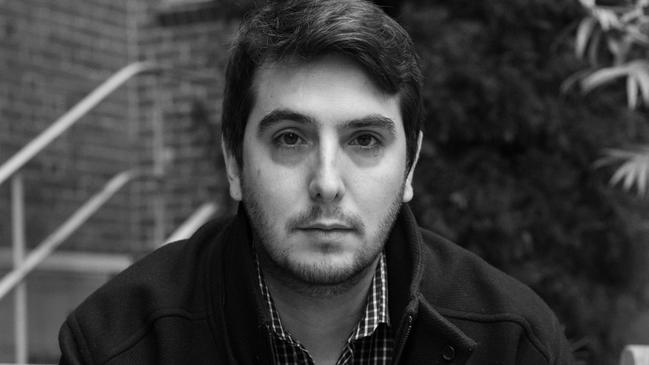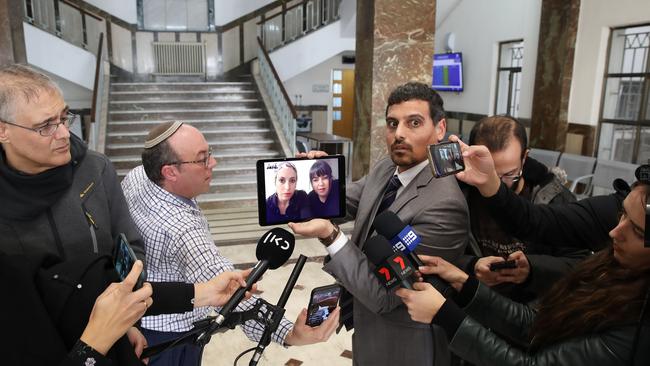Abomination and an Orthodox upbringing undone
Ashley Goldberg was raised in an Orthodox Jewish community in Melbourne, where the message was ubiquitous: Never assimilate.

I grew up in Caulfield, a southeastern suburb of Melbourne, comprising the largest population of Jews in Australia. Jewish inhabitants ironically refer to as “the Ghetto”. I attended a modern Orthodox Jewish school from kindergarten until year 12. We were taught Hebrew and Torah. We learnt about the Holocaust, about our special place as the “Chosen People”, as a “light unto the nations”, chosen by God to lead the rest of the world out of the dark.
In January this year my namesake, Whoopi Goldberg, stated on The View – a US panel show – that the Holocaust “was not about race”. In response to her comments, David Baddiel, author of Jews Don’t Count, appeared on Good Morning Britain and rebutted Whoopi’s statement. He said the Jewish people were indeed a race because, despite him being an atheist, “the Gestapo would have shot me tomorrow”.
Baddiel’s rhetoric is one I’m familiar with. Growing up, the message was ubiquitous and unavoidable – from school assemblies where we sung the Israeli anthem to the relentless study of countless texts and films on the Holocaust – you are Jewish Australians, not Australian Jews. Jewish members of the German economic elite were not spared from the gas chambers, what makes you think you would be? Never assimilate, it happened once, it could happen again. Here, among your own, this is where you’re safe.
The only member of my family to have been directly involved in the Holocaust, my mother’s father, Victor, died before I was born. Today, the tale of Victor’s escape from the Bialystok Ghetto has taken on mythical status in my family – he was a sniper in the uprising, 12 years old, dodging bullets as he bounded over a barbed wire fence. The boy behind him didn’t make it. The only thing anyone in my family knows for sure is where Victor ended up – Argentina. There he met my grandmother, started a family and refused to speak of the past.
But 10 years later, on immigrating to Australia, the past came for Victor. We have a name for it today – post-traumatic stress disorder. But back then all my mother and grandmother had were the hollow words of their local rabbi: “You have to understand, he’s still fighting the Germans.”
Today, individuals who suffer from PTSD can receive treatment in the form of medication and therapy, but even then there’s still a chance they will pass on some of their experience to their children. We have a name for that now, too – intergenerational trauma.
I am thankful my mother did not inherit her father’s violence, but his influence permeated her life nonetheless – fear ran thick in my mother’s veins. Sexual assault, theft, car accidents, injury, death. The world is rife with possible tragedies and, while it was within her power, my mother was unabashedly overprotective. My childhood was a litany of frustration and missed experiences – out there, in the world, anything could happen, but in my childhood home, under my mother’s watchful gaze, I was safe.
And then I left, both my home and the Jewish community. Once I was granted my independence, I stopped attending shule, checking ingredients for traces of pig or crustaceans, and participating in any and all activities associated with Judaism. There was no particular event or moment of epiphany that led to my lapse in faith. Like many young people, I was simply eager to gain my own sense of identity – one that hadn’t been thrust on me since birth.

Following graduation from university, I moved to Canberra and then England where, as a result of my surname, I identified as Jewish in name only. Years passed but, despite the distance, the echoes of stories from the Jewish community back in Melbourne still reached me – stories that shook me to my core.
An essential principle in Judaism is that of pikuach nefesh – the concept that where a life is at risk, Jewish law may be breached to save that life.Living in Canberra and working for the federal government, I had my finger on the pulse of most topical Senate inquiries, royal commissions and the general political milieu, but I was ill prepared for the 2013 Royal Commission into Institutional Responses to Child Sexual Abuse. Doubtless the sexual assault of children runs counter to the central tenets of most monotheistic religions, but reading about Manny Waks – one of 17 children from an Orthodox Jewish family based in Melbourne, he was sexually abused as a child, was ostracised for speaking out, and later became an activist – hit home. What about pikuach nefesh and the need to protect a life at all costs? Doesn’t the life of a child count?
At the time, I had vague recollections about the allegations against the principal of an Orthodox Jewish school and the abuse she allegedly committed, but as the ongoing extradition effort ramped up, I took the opportunity to investigate further. I saw what I believed to be an effort to protect an alleged abuser from facing the justice system, and condemnation of the abused for daring to speak out. Needless to say I was livid.
In 2018, I returned to Melbourne and began writing my debut novel,Abomination (Penguin Random House.) It’s the story of two men whose lives have taken two very different paths – a story that is close to me, about friendship and identity. But I suppose it is also more than that – a part of myself that I hadn’t been willing to engage with came out on the page and so Abomination is also a story about being disenfranchised, disappointed and angry at blatant hypocrisy, at the perpetuation of suffering by the devout followers of a religion that told me, my entire life, that it stood for compassion, goodwill and virtuousness, that we were the “Chosen People” – a race that for all of its own suffering and persecution should know better than to harbour the abusers of children, to vilify the abused.
Stay here, they say, amid the light – this is where you’re safe. But what happens when it’s the ones holding the light who commit horrendous acts of abuse? Who then will lead their victims out of the dark?
Ashley Goldberg was reared in an Orthodox Jewish community in Melbourne. This essay is part of an occasional Word First series in which writers talk about their work. Abomination (Penguin Random House) is out now.


